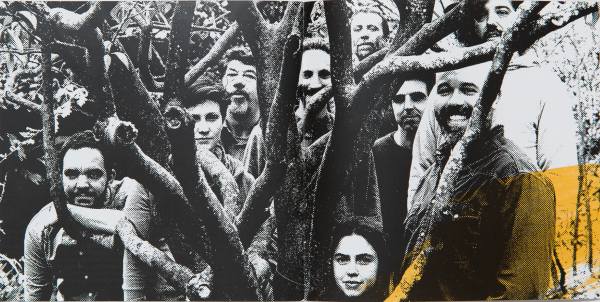 Retimbrar, based in the city of Porto, is at core a group using the wide range of Portuguese traditional percussion with vocals, but its instrumentation expands to cavaquinho, violin, bass, flutes and more, and for this album they collaborate with a range of individual and ensemble guests, so that the overall impression isn’t of a percussion album but a collection of songs, richly varied in melody, rhythm and arrangements.
Retimbrar, based in the city of Porto, is at core a group using the wide range of Portuguese traditional percussion with vocals, but its instrumentation expands to cavaquinho, violin, bass, flutes and more, and for this album they collaborate with a range of individual and ensemble guests, so that the overall impression isn’t of a percussion album but a collection of songs, richly varied in melody, rhythm and arrangements.
The material is built on traditional melodic and rhythmic structures, but the band, in particular singer Sara Yasmine, often adapt or extend melodies and write new lyrics in traditional style. (The lyrics, in Portuguese, are in the booklet but online translators don’t do a great job of conveying their sense in English. No problem for the music, though).
The format of several songs is call-and-response. For example the opener, “Vai Não Vai,” which contains the line from which the album title is taken, ‘Se aguantar da queda, vai levantar do chão’ (‘If you can withstand the fall, you will get up from the ground’). Over an urgent drive of cavaquinho, meaty assorted percussion and more, Yasmine, who in general is the group’s lead vocalist, does the calls, repeated by the rest of the group.
“Pastor à Paisana” has an airy bounce in the 7/4 ‘charro’ rhythm of north-east Portugal’s adjoining Spanish province of Zamora. For the springy “Manelo,” with its liquid synthy contributions, they’re joined by the four singers of the Grupo Folclórico Tradições do Baixo Douro.
Yasmine’s cherishing, slow singing in “Saudades do Futuro,” joined by singers from the Rancho Folclórico Santa Eufemia de Pé de Moira, is accompanied just by guest Miguel Arruda’s classical guitar. The guest on the relaxedly swinging “Maçazinha,” based on a Beira-Baixa song, is well-known Galician singer Uxía, with whom Retimbrar appeared in the opening concert of Womex in 2021 when it was in their home city of Porto.

|
|
The lead vocal in the bouncy “Lindo Par” is male, that of guest Rifo from the group Chulada de Ponte Velha, and the chorus is joined by the Rancho Folclórico As Padeirinhas de Ul from the town of Oliveira de Azimeis, from whom Retimbrar learned it. The instrumental “Montes” is led by the gaita de foles (bagpipe) of Ricardo Coelho, who composed it. “Festa de Gostei,” a catchy 5/4 waltz written by Yasmine and her co-artistic director António Serginho, opens with a cheeky cheesy electric organ. Its lead vocal alternating chattily between male and female, it has something of the feel of an Mediterranean comedy film, and after a slithery electric guitar break it collapses at the end into sounds of fireworks.

|
|
“Cosías da Minha Terra,” in which they’re joined by drummers and vocals from two grupos folclóricos from the Douro region, begins with massed drums, but switches into a bass line that underpins a lurching almost bossa-nova tempo. “Rosa Tirana” is from the tradition of the Douro region and found by the group on an Amália Rodrigues record; they give it a sinuous slow swing over which their female and male voices float, becoming choral, joined by the percussionists, cavaquinhos, violas braguesas and voices of two ensembles from Braga, and guest Portuguese guitar.

|
|
“Vai de Centro al Centro,” sung and hummed by the whole ensemble to a very appreciative live audience, is a dance-song from Baixo Alentejo that sounds familiar from the performances of other singers and groups including, as the booklet notes mention, Sopa de Pedra and Celina da Piedade. It segues into “Baile Mandado,” that contains a recording, made in his taverna in 1995 when he was 93, of the characterful voice and guitarra portuguesa of the Portuguese traditional singer António Cardoso to which it is a homage. He sings the verses, the group adding a chugging bass rhythm, the female voices harmonise in a mellifluous almost Andrews Sisters way, and the album ends with an enthusiastic audience repeating the chorus and clapping along.
Find the artists online.
|

